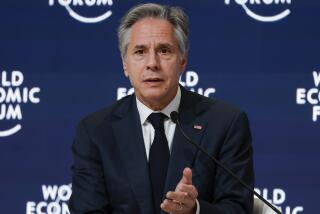Blair shuns Hamas on Mideast trip
- Share via
JERUSALEM — Former British Prime Minister Tony Blair met Tuesday with Palestinian and Israeli leaders in Jerusalem and the West Bank but avoided Hamas officials on the second day of his initial visit as the new Middle East envoy.
“I think there is a sense of possibility, but whether that sense of possibility can be translated into something, that is something that needs to be worked at and thought about over time,” Blair told reporters.
Palestinian Authority President Mahmoud Abbas gave a brief statement to reporters after his meeting with Blair, saying the two had discussed how the members of the so-called quartet that monitors Mideast peace efforts can help restart the stalled peace process.
“The president spoke about the necessity of reaching a plan to end the occupation and achieving the two-state solution,” said Saeb Erekat, a chief negotiator for the Palestinians, after the meeting.
As Blair visited with officials in Jerusalem and Ramallah, Palestinian students clashed at a university campus near the West Bank city of Nablus. The fight, which left several youths seriously injured, broke out when supporters of Abbas’ Fatah faction tried to prevent female students affiliated with the Islamic militant group Hamas from distributing leaflets, Palestinian officials said.
Fighting in the Gaza Strip between Fatah and Hamas last month has left Palestinians divided. Abbas, who is based in the West Bank, fired Prime Minister Ismail Haniyeh of Hamas and appointed an emergency government. But Haniyeh has refused to step down and continues to govern in Gaza.
Hamas won Palestinian parliamentary elections last year but is considered a terrorist organization by Israel, the U.S. and the European Union.
Israel is trying to erode Palestinian support for Hamas and has closed its border crossings with Gaza, sending the coastal territory’s already frail economy into a tailspin. Meanwhile, Western economic aid has flowed into the West Bank, and Israel has released millions of dollars in tax revenue it collects for the Palestinian Authority and freed hundreds of Palestinian prisoners, nearly all with Fatah, while issuing clemencies for hundreds of wanted militiamen.
Fawzi Barhoum, a Hamas spokesman in Gaza, said Blair’s efforts were marred by his refusal to meet Hamas officials.
“The mission will not be transparent or fair,” Barhoum said. “It’s going to be biased toward one party at the expense of the other party.”
Israeli observers also expressed doubt that Blair could make much progress.
“One can assume that Blair’s chances of success in the year and a half Bush has left in the White House are not particularly high,” wrote Shimon Shiffer in Yediot Aharonot, a major Israeli newspaper.
“Aside from his bountiful personal prestige, he has no real leverage to use on the parties to the conflict.”
Blair was appointed last month to act as an envoy by the members of the Mideast quartet -- the United States, the European Union, United Nations and Russia. But even before his first visit to the region in that capacity, his mandate had become a matter of debate.
Israel wants Blair to focus on economic issues and not get involved in any broader questions of borders, refugees or the future status of Jerusalem.
Palestinian officials insist that economic development cannot be separated from political negotiations.
“I don’t understand how we can differentiate between security, economic, [social] and political issues,” said Erekat, the Palestinian negotiator.
Blair has not indicated how he plans to use his new post.
He is scheduled to leave today after spending about 48 hours in the region but is planning to return in September, officials said.
Blair met Tuesday with Israeli opposition leader Benjamin Netanyahu, who heads the right-wing Likud Party, and with Israeli President Shimon Peres.
Peres said Blair faced “a mission rather than work.”
“We will help you because it also helps us,” said Peres, whose role as president is largely ceremonial.
Blair broke an unusually taciturn spell with the media on Tuesday, saying that his role for now was to listen, not talk.
“For the moment, I think it’s best that I see people, listen and then reflect.”
--
Special correspondent Maher Abukhater in Ramallah contributed to this report.
More to Read
Sign up for Essential California
The most important California stories and recommendations in your inbox every morning.
You may occasionally receive promotional content from the Los Angeles Times.









